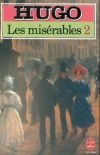
《레 미제라블》은 1862년에 프랑스의 작가 빅토르 위고가 쓴 소설로, 잘 알려진 19세기 소설 중 하나다. 제목인 레 미제라블은 ‘불쌍한 사람들’이라는 의미이며, 대한민국에서는 《장발장》으로도 소개되었다. 프랑스 민중들의 비참한 삶과 1832년에 있었던 프랑스 6월 봉기를 소재로 하였다. 민중들에 대한 작가의 관심과 사회개혁의지를 보여주는 사회소설 분류되기도 하나 실제로는 인간의 죄와 구원에 대한 실천적인 해법은 무엇인가에 대한 작가의 대답이기도 하다. 실례로 시민혁명에 동참했다가 정부군의 진압으로 부상당한 마리우스를 장발장이 하수도를 통해 피신시키는 장면은 …

《파리의 노트르담》은 프랑스의 작가 빅토르 위고가 1831년에 발표한 소설이다. 15세기 프랑스 파리의 노트르담 대성당을 배경으로 노트르담 성당과 얽힌 여러 인물들의 운명과 15세기 프랑스 사회상을 묘사하고 있다.

Hesperus Press, as suggested by their Latin motto, Et remotissima prope, is dedicated to bringing near what is far—far both in space and time. Works by illustrious authors, often unjustly neglected or simply little known in the English–speaking world, are made accessible through a completely fresh editorial approach …

This scarce antiquarian book is a facsimile reprint of the original. Due to its age, it may contain imperfections such as marks, notations, marginalia and flawed pages. Because we believe this work is culturally important, we have made it available as part of our commitment for protecting, preserving, and promoting …

Ninety-Three is the last novel by the French writer Victor Hugo. Published in 1874, shortly after the bloody upheaval of the Paris Commune, the novel concerns the Revolt in the Vendée and Chouannerie – the counter-revolutionary revolts in 1793 during the French Revolution. It is divided into three parts, but not …

《레 미제라블》은 1862년에 프랑스의 작가 빅토르 위고가 쓴 소설로, 잘 알려진 19세기 소설 중 하나다. 제목인 레 미제라블은 ‘불쌍한 사람들’이라는 의미이며, 대한민국에서는 《장발장》으로도 소개되었다. 프랑스 민중들의 비참한 삶과 1832년에 있었던 프랑스 6월 봉기를 소재로 하였다. 민중들에 대한 작가의 관심과 사회개혁의지를 보여주는 사회소설 분류되기도 하나 실제로는 인간의 죄와 구원에 대한 실천적인 해법은 무엇인가에 대한 작가의 대답이기도 하다. 실례로 시민혁명에 동참했다가 정부군의 진압으로 부상당한 마리우스를 장발장이 하수도를 통해 피신시키는 장면은 …

《레 미제라블》은 1862년에 프랑스의 작가 빅토르 위고가 쓴 소설로, 잘 알려진 19세기 소설 중 하나다. 제목인 레 미제라블은 ‘불쌍한 사람들’이라는 의미이며, 대한민국에서는 《장발장》으로도 소개되었다. 프랑스 민중들의 비참한 삶과 1832년에 있었던 프랑스 6월 봉기를 소재로 하였다. 민중들에 대한 작가의 관심과 사회개혁의지를 보여주는 사회소설 분류되기도 하나 실제로는 인간의 죄와 구원에 대한 실천적인 해법은 무엇인가에 대한 작가의 대답이기도 하다. 실례로 시민혁명에 동참했다가 정부군의 진압으로 부상당한 마리우스를 장발장이 하수도를 통해 피신시키는 장면은 …

Hernani is a drama by the French romantic author Victor Hugo. The play opened in Paris on 25 February 1830. Today, it is more remembered for the demonstrations which accompanied the première, and for being the inspiration of Verdi's opera Ernani, than it is for its own merits. Hugo had enlisted the support of fellow …

 English
English Español
Español Deutsch
Deutsch

